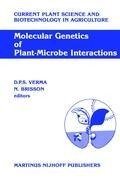
-
 Anglický jazyk
Anglický jazyk
Molecular Genetics of Plant-Microbe Interactions
Autor: N. Brisson
Increased interest in the basic biology of plants and microorganisms stems from the fact that crop productivity is directly affected by plant-microbe interactions. In spite of the fact that plants exist in the environment amongst diverse species of microorganisms,... Viac o knihe
Na objednávku
148.49 €
bežná cena: 164.99 €
O knihe
Increased interest in the basic biology of plants and microorganisms stems from the fact that crop productivity is directly affected by plant-microbe interactions. In spite of the fact that plants exist in the environment amongst diverse species of microorganisms, only a few ever establish a direct relationship. Emerging awareness concerning the indirect effect of microbial association on plant growth and the possibility of using one microbe against another for controlling pathogenic interactions is at the genesis of new fields of studies. The primary reason for a microbe to associate with· photoautotrophic organisms (plants) is to tap its nutritional requirements, fixed carbon, as a source of energy. By hook or by crook, a microbe must survive. Some have evolved mechanisms to exploit plants to develop a niche for their biotropic demands. When in contact with a living plant, microorganisms may live in a passive association using exudates from the plant, invade it pathogenically or coexist with it in symbiosis. The plant responds to the interloper, either reacting in a hypersensitive manner to contain the invasion of pathogens, or by inducing a set of genes that leads toward symbiosis, or by simply succumbing to the invader. Thus, prior to contact wi th the plant, mic roorganism is able to sense the presence of the host and activate accordingly a set of genes required for the forthcoming interaction, whether symbiotic or pathogenic.
- Vydavateľstvo: Springer Netherlands
- Rok vydania: 1986
- Formát: Hardback
- Rozmer: 241 x 160 mm
- Jazyk: Anglický jazyk
- ISBN: 9789024734269












